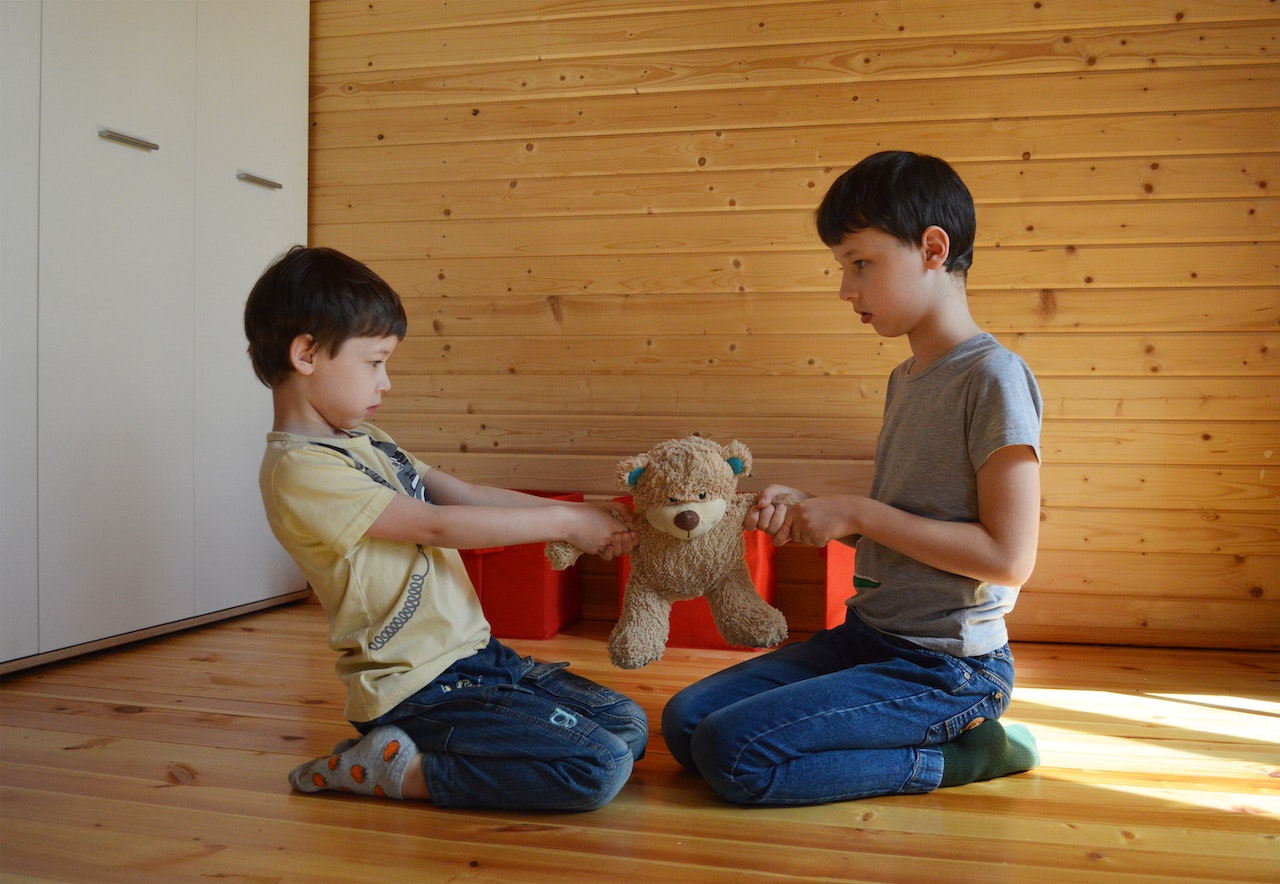Sibling rivalry. That age-old tradition that’s as natural as breathing and twice as loud. If you’re reading this, chances are you’re at your wits’ end and ready to referee yet another bout between little Johnny and Sally. Or perhaps you’re just curious about how you can make the WWE-inspired smackdowns in your living room more, shall we say, “civilized”? Either way, you’re in the right place.
Let’s get one thing straight, folks: Sibling rivalry is just children’s way of preparing for the real world, where we all know adults never bicker, fight, or disagree. Nope, never. But since we’re adults and we’ve evolved beyond such behavior (ahem), it’s our duty to help our offspring move past this adorable phase.
The Enigma Behind Sibling Rivalry: What Causes It?
Before we dive into our advice, let’s pause for a moment. Why do siblings, those lovely little cherubs you’ve painstakingly raised, seem to turn on each other with the ferocity of wild beasts battling for the last slice of pizza?
- Nature vs. Nurture: Well, here’s the thing: It’s a mix of both. Some experts believe there’s an innate competition ingrained from our evolutionary days. After all, every caveman kiddo wanted to ensure they got the juiciest mammoth steak. Meanwhile, others argue it’s all about the environment. When resources (read: parental attention, toys, or the last cookie) are limited, it’s every child for themselves.
- Attention, Please! The bulk of sibling rivalry often boils down to a simple quest for attention. Your children, no matter their age, yearn for your approval, time, and undivided attention. And let’s be honest, there’s only so much of you to go around. So, if pushing little Jimmy off the swing means five uninterrupted minutes of consoling (i.e., attention) from you, well, some kids might consider that a trade-off.
- Individual Identity: Every child is trying to carve out their unique identity, and sometimes this means differentiating themselves from their siblings in any way possible. If big sis is the “smart one”, little bro might feel the need to be the “sporty one”. But what if little bro also wants to be smart? Cue rivalry.
- Mimicking Adults: Surprise, surprise! Sometimes, our little darlings are just mirroring the behavior they see around them. If Mom and Dad handle disagreements with shouting matches or passive-aggressive snark, the kids might just think that’s the standard protocol.
- Inequality & Injustice: Perceived or real, if one child feels they’re getting the short end of the stick (whether it’s fewer M&Ms or less praise), resentment can brew. Children, like adults, have a deeply ingrained sense of fairness. And they’re not afraid to voice it. Loudly.
Understanding the root causes of sibling rivalry doesn’t necessarily make it any easier to handle, but it does offer a touch more empathy for those pint-sized gladiators you’re raising. Now that we’ve set the stage, let’s jump into the ways you can navigate these treacherous waters. And remember, a little humor goes a long way!
Techniques in Sibling Warfare Management
1. Buy Earplugs.
OK, this one’s for you. Seriously. Best investment you’ll ever make. Not for the kids, of course. They need to hear your endless wisdom about sharing and compassion. But sometimes, for your sanity, you need to tune out the 57th argument about who got the bigger slice of cake.
2. Equality is Overrated.
Remember the time when you tried to ensure both kids got the exact same number of M&M’s, and they still managed to fight over who had more blue ones? Instead of getting out the scales every time, remind them of an age-old wisdom: Life isn’t fair. It’s a lesson they’ll thank you for… eventually. Maybe in 20 years. On a therapist’s couch.
3. Scheduled Turns: Because It’s ALWAYS About The Blue Toy.
Whichever toy it is they’re fighting over, make a schedule. Monday: Johnny’s day with the blue toy. Tuesday: Sally’s. And so on. Make sure to mark it on a calendar in a public place. Then, when the inevitable “It’s MY turn” chorus begins, just point. Save your breath. You’re going to need it for yelling about homework later.
4. Safe Zones Are A Thing.
Designate areas in your home where each child can have their own personal space. It’s like a mini-UN for kids. This little sanctuary provides a retreat and might help keep the peace, at least for a few minutes. Bonus: You get to feel like a diplomat without having to deal with actual international crises.
5. Teach Them to Use Their Words, Not Their Fists (or Teeth).
I know, it sounds like common sense. But just remember the last time you wanted to throw your computer out the window because it froze? Kids don’t have that restraint. Yet. So it’s up to us to teach them that words, while mightier than the sword, are also less likely to cause time-outs or missing teeth.
6. Try Not To Compare (Even if One is Clearly the Angelic Prodigy).
Your kids are different. Shocking, right? Sally might be great at math, while Johnny can play the violin like a mini Mozart. Avoid comparing them, no matter how tempting it might be to say, “Why can’t you be more like your sister/brother?” Instead, appreciate their individual talents. Because let’s face it, not everyone can be the shining star of every family talent show.
7. Invest in Decoy Toys.
You know how when one child has a toy, suddenly the other MUST have it too? Solution: Decoys. Have identical (or just confusingly similar) toys at the ready to deploy at a moment’s notice. Some might call it trickery. I prefer to call it “advanced parenting strategy.”
8. Play The Long Game.
Encourage your kids to envision a future where they might actually need each other. Like when they conspire to break curfew or need to borrow money as broke college students. The ‘buddy system’ begins at home, after all.
9. Mediation Training.
Consider sitting the kids down and running a proper mediation session. Open with, “How does it make you feel when Johnny uses your crayon?” It sounds silly, but you’re cultivating the next generation of negotiators. Or at the very least, giving them a taste of what those boring HR meetings will be like when they grow up.
10. Create Sibling Appreciation Days.
It’s like Valentine’s Day but for siblings. Make them write appreciation notes to each other. Will they be dripping with sarcasm? Maybe. But hey, at least they’re communicating without any shouting or hair-pulling involved.
11. Set Up A Reward System.
Now, I’m not suggesting bribery. Think of it more as a… tactical incentive. If they can go a whole day without fighting, reward them. If they make it a week, perhaps something a bit bigger. If they manage a whole month? Well, then you probably live in an alternate universe, but just in case, maybe get them a unicorn or something.
12. Group Projects Aren’t Just for School.
Force them into teamwork. Whether it’s a puzzle, a house chore, or planning a surprise for Mom and Dad (win-win!), make them work together. They might find out they actually can cooperate when they want to. Or they’ll just both blame each other when things go awry. It’s a toss-up.
13. Share War Stories.
Share stories of your own childhood and the silly fights you had with your siblings. Make sure to embellish generously. By the end of it, your kids might just be grateful they only fight over toys and not the last parachute out of a burning airplane. (What? They don’t need to know.)
14. Love, Love, Love.
Amidst all the squabbles, make sure they understand the love they have for each other. They might roll their eyes when you remind them they’re best friends, but deep down, somewhere between the exasperated sighs and dramatic groans, they know it’s true.
15. And Lastly, Remember…
When all else fails, remember that one day, they’ll grow up and move out. And then you can sit back, relax, and wait for the phone calls about how their roommates are just so annoying. Ah, sweet karma.
Conclusion
Managing sibling rivalry is a blend of art, science, luck, and, well… sheer parental determination. But remember, through all the chaos, you’re not just raising kids; you’re shaping the future dynamic duo (or trio or more) that will one day reminisce about these golden days. And probably have a good laugh at your expense. But hey, it’s all in the name of love!
Pro Tips: Sibling Rivalry Survival Hacks
Once you’ve trudged through the muddy waters of sibling skirmishes, here are some expert, and slightly cheeky, pro tips to keep in your back pocket:
1. Secret Stash: Have a hidden stash of toys, snacks, or surprises. When things get really hairy, distract and conquer. “Look what I found! Who can get along the longest to earn it?”
2. The No-Blame Game: When an argument reaches DEFCON 1, instead of playing detective to find out who started it (spoiler: it’ll always be “not me”), focus on how they can resolve it together.
3. Spontaneous Dance Party: Music is a universal peacekeeper. When tensions rise, blast their favorite tune and instigate a dance-off. If nothing else, they’ll be too winded to argue!
4. Memory Lane: Every once in a while, show them pictures or videos from when they were younger and got along. A bit of nostalgia can be a powerful reminder that they’re on the same team.
5. United Front: Ensure all caregivers are on the same page. Grandma can’t be playing favorites, and Uncle Bob needs to know the rules. Consistency is key.
6. Family Meetings: Regularly sit down as a family to air grievances (in a friendly way!). Sometimes, just having a safe space to talk can prevent bigger blow-ups later.
7. The Switcheroo: Once in a while, change up the routines. If one child always gets to pick the TV show or the bedtime story, swap it around. Everyone loves a curveball.
8. Outside Interests: Encourage each child to have their own hobby or activity. It gives them a sense of individuality and provides a break from each other.
9. Lead by Example: Let them see YOU resolving conflicts in a calm and rational manner. And if they catch you in a heated debate with your partner over whether pineapple belongs on pizza, make sure they also see the make-up process.
FAQs: Navigating the Sibling Rivalry Minefield
In short, yes, it’s pretty normal. While not all siblings have WWE-style smackdowns, most will have disagreements or tensions at some point. It’s a natural part of growing up and developing as individuals.
No, whether you have two kids or ten, the potential for rivalry exists. It’s not the number, but the dynamics and individual personalities that play a more significant role.
While the nature of their disagreements might evolve, many siblings find a stronger bond as they mature. The fights over toys will likely be replaced by mutual support in their adult challenges.
Parenting can influence dynamics, but it’s not solely to blame. Biological, developmental, and external factors all play a part. Just ensure you’re providing tools and examples for healthy conflict resolution.
Not necessarily. Sometimes, it’s beneficial to let them work it out themselves (as long as it’s not escalating to violence). They learn negotiation skills and problem-solving. But do step in if things get too heated or if there’s a risk of emotional or physical harm.
It’s worth looking deeper. That child might be facing external pressures or internal challenges. A chat with them or seeking advice from professionals might be beneficial.
Safety first. Separate them immediately and ensure everyone is okay. Once calm, discuss the consequences of violence and teach alternative ways of expressing anger or frustration.
It’s natural for parents to have different bonds with each child based on shared interests, but it’s crucial to ensure each child feels valued and loved. Spend individual quality time with each and celebrate their unique achievements.
It can, but it’s not a foregone conclusion. The skills and dynamics they develop now will influence their future relationship. This is why it’s essential to guide them towards healthy conflict resolution.
Not necessarily. Each sibling relationship is unique. While family patterns can influence, you have the power to guide your children differently.



